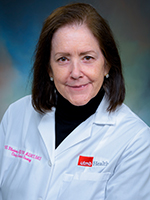
Glory Childs looked forward to a day of shopping when she stopped by her doctor’s office in the fall of 2019 to pick up a prescription for a refill.
“You know, you haven’t had a pap smear in years,” her doctor said.
Childs, 64 now, already knew that. She hadn’t had a pap smear in about 10 years.
“I had a hysterectomy in my late 40s,” Childs said. “And I didn't go back for a well-woman check.” She didn’t think any of these annual exams applied to her anymore.
She was especially not interested in the mammogram the doctor mentioned she needed as well.
Glory tried her best to get out of the mammogram, but the helpful receptionist insisted on scheduling everything. Getting the mammogram would be simple because it was in the same building at the UTMB Health League City Campus.
“It’s right next door,” the receptionist told her.
Childs gave in and got the mammogram done the same day. What she discovered next changed her life.
The mammogram showed two suspicious spots. Her doctor told her she would need a biopsy. After the biopsy, Childs got a call at work. She had cancer.
“On the way home, it really hit me because cancer is cancer,” Childs said. “I was really praying driving home, and I stopped at the store to get something. I lost some money in my change.”
That wasn’t like her, but the news had thrown her. She kept trying to add it up.
Friends, family and healthcare professionals helped her with tough choices. Her UTMB Health doctors, including Dr. Suzanne Klimberg, an oncological surgeon, and Dr. Julie Park, plastic surgeon, guided her, Childs said.
“My primary doctor—the one who suggested that I have the mammogram—called and talked to me,” Childs said. “She told me Dr. Klimberg is a very good doctor, and that she trusted her. That was a relief to me.”

But adding to her stress was the pressure of her job as a customer service representative for an insurance company. She would need time off for her mastectomy and recovery and reconstruction and any other procedures she might need.
“They didn't like for you to take off from September to February,” Childs said. “That was our busy season. I was diagnosed in October 2019, so I had surgery in November.”
She would need another surgery that February for reconstruction of her breasts.
“I just couldn't handle it,” Childs said. “It was very depressing to me.”
Her sister moved in with Childs and her husband to help, including keeping the draining tubes from her surgical wounds clean. Childs was too sore to do it.
“She would get all the fluids and blood out,” Childs said. “You could see all these particles and stuff coming out.”
She was depressed and didn’t feel like eating, but her sister insisted and made sure she got her protein.
“I didn’t think I was ever going to heal,” Childs said.
She had reconstructive surgery in 2020, and then in 2021, she had another part of the reconstruction done.
“Each time, I took time off from my job, and each time, they would say, ‘We don’t have to hold your job,’” she said.
She noticed it took her longer to heal, and she wondered if the job stress was why.
It was easy to decide to retire from that job in 2021, and Child doesn’t regret putting her health first. Her husband encouraged her to do it, also.
Childs hesitated about joining a support group for breast cancer patients and survivors, but during the COVID pandemic, she could attend Zoom meetings and not feel pressured to say anything. After a few meetings, she did start sharing because she began
to see how much she had in common with other women. Eventually, she met with other support group members in person.
And she began to see things a little different. Her pastor from church visited her in the hospital. Other people didn’t have that kind of support. Her sister helped with awkward personal tasks. Other women didn’t have a dedicated sister. It
overwhelmed her to understand how much support she already had.
“I would watch TV and see the St. Jude commercials come on,” Childs said. “And I would see all those babies with cancer. Now, why do I think I don't deserve cancer but a baby who doesn't know what's going on has it? That kind of changed
my attitude.”
Childs participates in various breast cancer awareness events. Recently, she agreed to be in a fashion show. It wasn’t her idea, but she didn’t mind selling tickets to her family. At the fashion show, she was surprised with a huge gift basket,
her reward for selling the most tickets. Her extended family of nieces and nephews showed up for their Aunt Glory.
Childs went back to see her UTMB Health primary care provider for a refill and a talk.
“I just said, ‘Woman, thank you for saving my life, because I wouldn't have had a mammogram had you not been so insistent.’"
View the print story